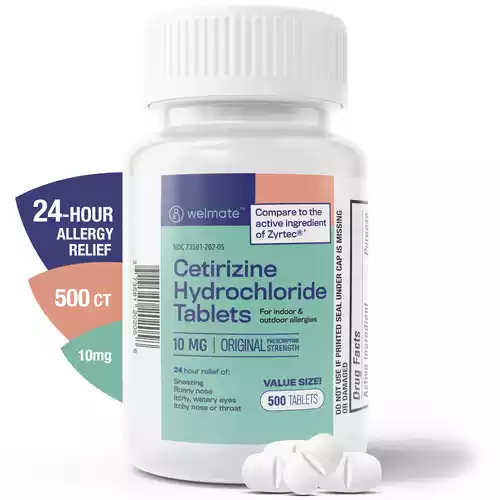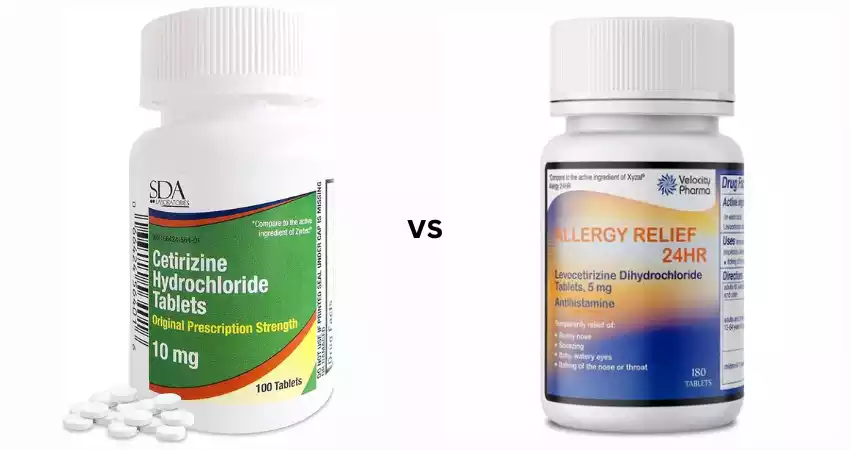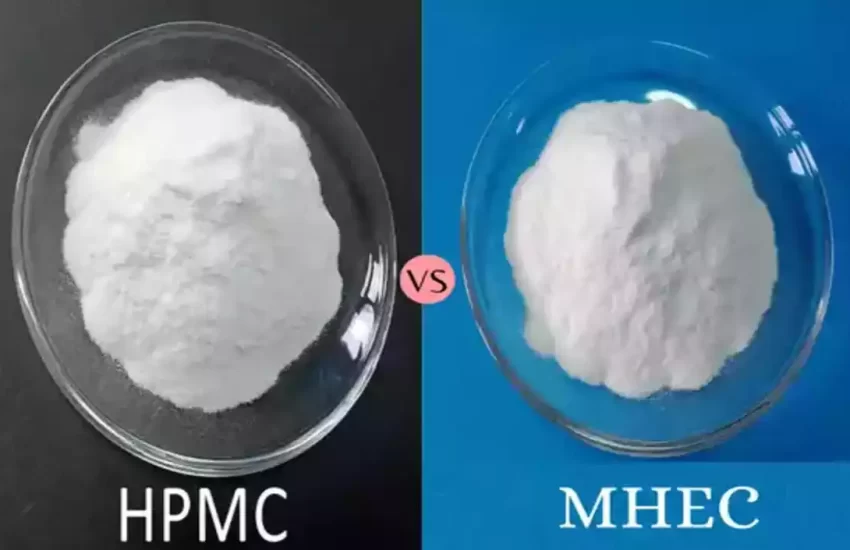Difference Between Cetirizine and Levocetirizine Dihydrochloride
Cetirizine and Levocetirizine Dihydrochloride are closely related antihistamines used to alleviate allergy symptoms. While both are effective in treating conditions like hay fever and hives, the key difference lies in their chemical structures.
Levocetirizine is a more refined form of Cetirizine, containing only the active ‘levorotatory’ enantiomer. This slight variation often leads to improved potency and possibly reduced side effects in Levocetirizine. Understanding their similarities, disparities in potency, and practical applications assists in making informed decisions about their use in managing allergic reactions.
What is Cetirizine Hydrochloride?
Cetirizine is a second-generation antihistamine medication primarily used to alleviate symptoms associated with allergic reactions, such as hay fever (allergic rhinitis), hives (urticaria), and other allergic conditions.

It works by blocking the action of histamine, a natural substance produced by the body during allergic responses, thereby reducing symptoms like sneezing, itching, runny nose, and watery eyes. Cetirizine is available in various forms, including tablets, chewable tablets, and syrup, and is generally well-tolerated with a low incidence of causing drowsiness compared to older antihistamines.
What is Levocetirizine Dihydrochloride?
Levocetirizine Dihydrochloride is a second-generation antihistamine belonging to the same class as Cetirizine. It is a derivative of Cetirizine and contains only the active enantiomer (levorotatory) found in Cetirizine. This formulation is considered to be a more refined version.
Levocetirizine works by selectively blocking the H1 histamine receptor, thereby reducing the effects of histamine release in the body during allergic reactions. It is used to treat symptoms associated with allergic conditions such as allergic rhinitis (hay fever), chronic idiopathic urticaria (hives), and other allergic manifestations.

Levocetirizine is available in tablet or syrup form and is known for its effectiveness in managing allergies with a relatively low incidence of causing drowsiness compared to some older antihistamines.
Comparison chart of Cetirizine and Levocetirizine Dihydrochloride
Below is a comparison chart highlighting the best differences between Cetirizine and Levocetirizine Dihydrochloride:
| Criteria | Cetirizine | Levocetirizine Dihydrochloride |
|---|---|---|
| Chemical Composition | Contains both levorotatory and dextrorotatory enantiomers of Cetirizine | Contains only the levorotatory enantiomer of Cetirizine, the active form |
| Formulation | Available in tablets, chewable tablets, syrup, and other forms | Available in tablet and syrup forms |
| Mechanism of Action | Blocks H1 histamine receptors, reducing allergic symptoms | Selectively blocks H1 histamine receptors, similar to Cetirizine |
| Potency | Standard potency | Slightly higher potency in the active enantiomer |
| Onset of Action | Typically starts working within 1 hour after ingestion | Starts working within 1 hour after ingestion, similar to Cetirizine |
| Duration of Action | Effects last around 24 hours | Effects last around 24 hours, akin to Cetirizine |
| Side Effects | May cause mild drowsiness in some individuals | Generally well-tolerated with minimal drowsiness |
| Efficacy | Effective in treating allergic rhinitis, hives, and other allergic conditions | Effective in managing allergic rhinitis, hives, and similar allergic manifestations |
| Availability | Widely available over-the-counter and as prescription medicine | Available both over-the-counter and by prescription |
Similarities – Cetirizine Hydrochloride and Levocetirizine Dihydrochloride
When experiencing an allergic reaction, these medicines work by blocking histamine release by your body to alleviate symptoms.
- Precautions: Both medicines should generally be safe for most individuals; however, caution must be exercised with those living with kidney or liver conditions as dosage adjustments may be required in such instances.
- Pregnancy and breastfeeding: Both drugs are generally safe to take during gestation and breastfeeding; however, for the best possible care consult a healthcare provider first before making decisions based on them during these times.
- Onset: Both medications should begin working within an hour after ingestion; Levocetirizine Dihydrochloride may take effect faster than Cetirizine Hydrochloride.
- Side Effects: While both medications share similar side effects, such as drowsiness, dry mouth, headache, and nausea; Levocetirizine Dihydrochloride may be less likely to induce sleepiness than Cetirizine Hydrochloride.
Which one to choose between Cetirizine Hydrochloride and Levocetirizine Dihydrochloride
Selecting between Cetirizine Hydrochloride and Levocetirizine Dihydrochloride will depend upon various factors, including the severity of allergy symptoms, individual medical history, and personal preference. Levocetirizine Dihydrochloride tends to be more potency and effective than Cetirizine Hydrochloride but may require an active valid prescription in order to access.
Cetirizine Hydrochloride may provide enough relief for mild-to-moderate allergies when over-the-counter medication fails. But for severe or chronic allergies that don’t respond sufficiently, Levocetirizine Dihydrochloride could offer greater potency; making it capable of controlling severe allergy symptoms than its competitors.
Before taking antihistamines, it is always a good idea to consult a healthcare provider in order to find an antihistamine that best matches an individual’s specific needs and medical history. He or she can advise which will meet this goal best.
Conclusion
Cetirizine and Levocetirizine Dihydrochloride are antihistamines that treat a variety of allergic conditions. These include seasonal and perennial allergic rhinitis as well as urticaria and allergic conjunctivitis. Both work by blocking histamine production within your body during allergic reactions – blocking these chemicals can prevent an uncomfortable allergic response and increase overall comfort levels.
Both medications possess similar mechanisms of action, precautions and side effects; however, Levocetirizine Dihydrochloride is generally thought to be more powerful and effective. Unfortunately, it’s also more costly, typically only being available with a valid valid valid valid prescription.
Cetirizine Hydrochloride and Levocetirizine Dihydrochloride should ultimately be chosen based on personal factors, including severity of allergic symptoms, medical history and personal preferences. Before making your selection between them it is always wise to consult a healthcare provider who can determine which antihistamine medication best matches an individual’s specific needs and medical background.


